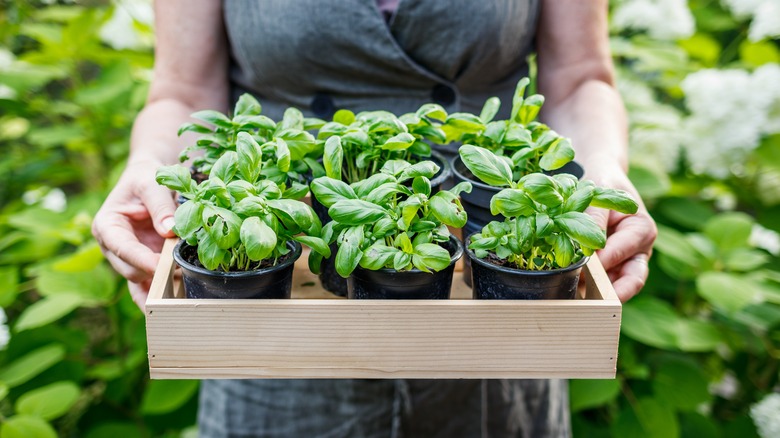A Basil 'Barrier' Is Your Garden's Best Natural Defense Against Bugs
Any eco-conscious gardener knows the harmful effects chemical bug sprays can have on plants and the environment. While great at deterring pests, these toxic solutions can damage the delicate balance of your garden's ecosystem. Alternatively — basil is a simple and natural solution. Although common in most herb gardens, its role extends beyond spicing up your culinary creations. This herb doubles as a natural, potent barrier against bothersome bugs. By strategically growing and placing basil around your garden or interspersing it among your other plants, you're creating a fragrant fortress that keeps bugs at bay.
If you locate basil around certain plants — roses or tomatoes, for instance — you should observe a marked decrease in usual pest activity in your garden. Common culprits like the asparagus beetle, mosquitoes, carrot flies, hornworm, and whiteflies seem to become scarce in the presence of the pungent herb. Their behavior shows that they'd prefer to forage in less olfactorily intense environments. We will delve deeper into why basil is such an effective deterrent against pests, explore the science behind it, and provide practical tips on how to best use it in your garden for maximum pest control.
Strategic planting to maximize basil's bug-repelling powers
Now comes the exciting part of leveraging the benefits of basil through clever gardening practices. Picture basil as your garden's silent but potent guardian. The key here lies in the planting strategy you employ. One such technique is companion planting, which seasoned gardeners frequently use. By placing plants together that benefit each other, you can enhance growth, improve yield, and reduce pest infestation. For instance, you can grow some basil and intersperse it among your tomato vines. Basil is also known to be a great companion plant for other crops. Consider integrating it among root vegetables, marigolds, and peppers.
But the strategic placement of basil extends beyond the soil in your garden. You can also pot basil plants, providing mobility and flexibility. If a certain area of your garden suddenly faces an increase in bug activity, simply move your potted basil plants to that area. This flexibility allows you to address pest infestations dynamically, based on the changing needs of your garden. As a bonus, pots of basil around your outdoor seating areas keep mosquitoes at bay, creating a peaceful and pest-free outdoor environment for your enjoyment.
The bug-repelling scent of basil
Insects are attracted to the vibrant colors and alluring scents of a garden, however, they become overwhelmed by the robust aroma of basil. The reason for this lies within the very fabric of the plant. Within the supple leaves of the basil plant, essential oils like citronellal are hidden away, ready to be released into the air. These oils, which also contribute to the flavor we love in our favorite dishes, produce a scent that serves as a powerful deterrent for many common garden pests. It confuses their olfactory system, disrupting their ability to find their desired plants.
Furthermore, certain basil kinds, such as Holy Basil and Lemon Basil, provide additional levels of defense. These plants are high in phytochemicals, including eugenol, which has antibacterial and antifungal activities. These substances not only repel pests but also protect your plants from illnesses, providing an extra layer of protection for your garden. Finally, if you prefer a more environmentally friendly pest control solution, using basil is ideal. There are no harsh chemicals involved that can inadvertently kill beneficial insects or harm the local ecosystem.

